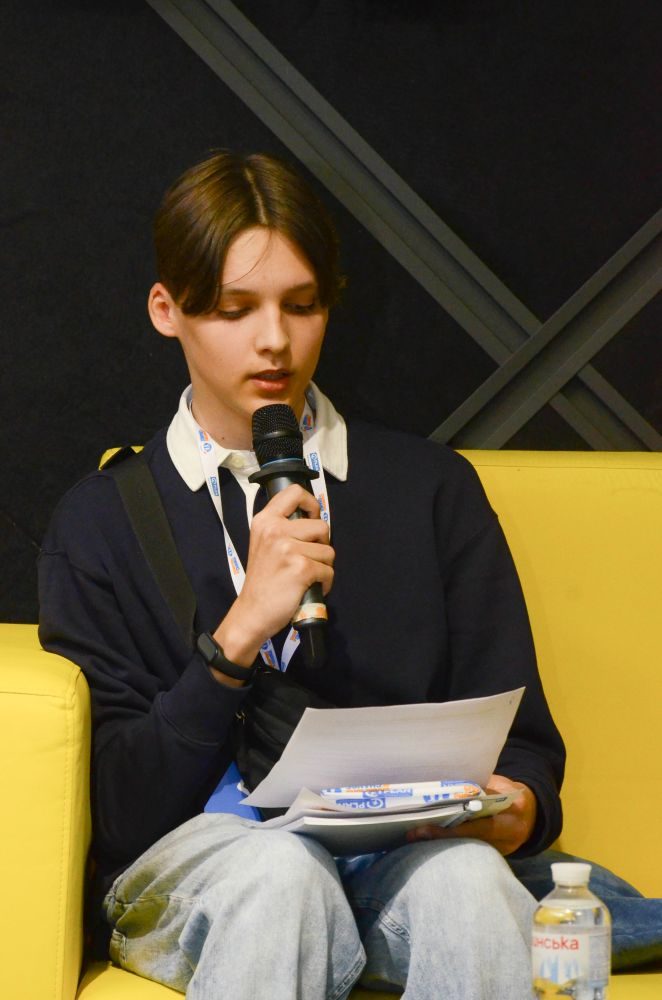Becoming a Champion of Change
After leaving home due to conflict and transitioning to online school, Yehor, 15, found empowerment through collaborating with like-minded peers on advocacy messages, learning about the impact of gender inequality, and discovering the strength of youth voices.

Yehor, 15, was forced to leave his home in Kharkiv when it was destroyed in military conflict, and now lives in Kyiv with his mother, father, and younger brother. He has been studying online for 2 years because he does not want to change schools during his senior years of high school. Yehor spends time mainly with a couple of friends from Kharkiv, who also moved to Kyiv, or come there from time to time. In peaceful times, when his school operated offline, he served as the secretary of his class.
After graduating from school, Yehor wants to receive a psychology diploma. “I want to be a psychologist,” he explains. “I want to understand how people’s psyche works, how our mind influences our body, and how emotions work.” His inspiration comes from his mother, who is a social pedagogist who works with adolescents. It was from her that Yehor first learned about gender equality and the necessity of advocacy efforts for social change.
Gender inequality in conflict
In Ukraine, living through conflict has devastating consequences on young people, putting their physical and psychological safety at tremendous risk. Millions of children in Ukraine are forced to deal with the stress, anxiety, isolation, and tension of living with this reality daily. The unseen or under-reported dangers to children, youth, and young adults, such as mental health struggles, child protection risks, and increased risk of sexual and intimate partner violence, are often ignored but are critical to address. The escalation of conflict in Ukraine since February 2022 has created an extremely stressful environment for many communities, including those directly affected by or near the conflict (such as in Kyiv, Sumy, and Kharkiv) and for communities inside Ukraine that host many internally displaced people. There are also increased protection risks, including gender-based violence (GBV) rooted in gender inequality and harmful social norms, which are on the rise.
“Youth are also a part of society, and our voices should be heard and included… Our voice matters.”
Yehor, 15
Women and girls – especially those traveling alone – are at heightened risk of human trafficking, sexual exploitation, and abuse in highly insecure areas, at border crossing points, in transit, in collective centres, and in bomb shelters. The increase in intimate partner violence is particularly alarming. It is frequently under-reported due to the limited police capacity to respond in the absence of proper training, poor understanding of how to have a victim-centred approach, and generalised normalisation and minimisation of the issue.
However, young people like Yehor have the ability to spark change. “Youth are also a part of a society, and our voice should be heard and included,” says Yehor. “Not only do older people have the right to make decisions, but youth also, since we have a fresh perspective. Our voice matters.”
Creating Champions of Change
Yehor joined the Champions of Change programme to meet new friends and like-minded adolescents and further develop his leadership skills – and it was there that he began to deepen his knowledge of gender inequality and realise that his voice matters.
The Champions of Change programme encourages youth to develop advocacy messages on issues they are passionate about, including one called ‘Education is the starting point.’ “We need the same programmes at schools to raise awareness about gender equality and learn how to be more courageous, to be heard, and implement our own ideas,” Yehor explains. “Young people should understand that it is possible, not unrealistic.”
For youth like Yehor, the Champions of Change programme offers a space to express their thoughts freely and without judgement. “In general, the sessions and exercises were extremely interesting,” he says. “I liked everything, and I believe anyone has the right to speak openly and be treated equally.”
“Young people should understand that it is possible, not unrealistic.”
Yehor, 15
About the project
Plan International began implementing the Rising Strong pilot project in 2024 in the Kyiv, Sumy, and Kharkiv communities, focusing on fostering resilience through mental health and psychosocial support, increasing awareness of gender-based violence prevention, and equipping girls, boys, and youth with the knowledge and skills necessary to advocate for gender equality with their communities. The project leverages local knowledge, expertise, and existing infrastructure of our partner organisations to provide programming for conflict-affected children and adolescents, employing Plan International’s flagship Champions of Change methodology.
Categories: Education, Emergencies, Youth empowerment


